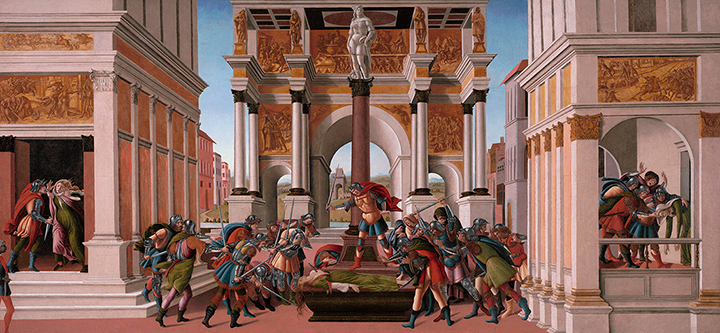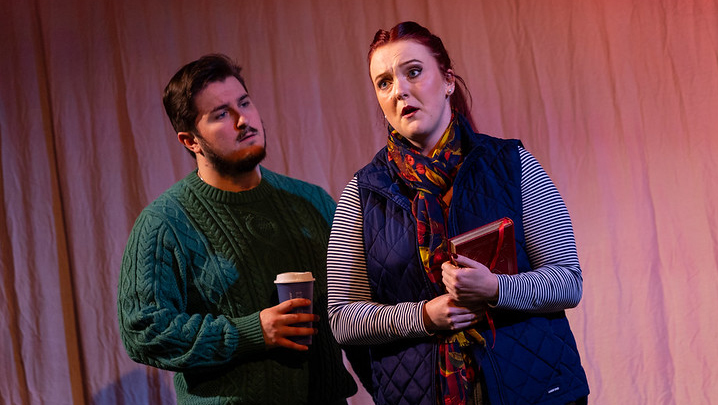
I’ve previously seen it only once before, at the Edinburgh Festival in a semi-staging that suited the rather static nature of this chamber opera, which often feels more like an oratorio than a drama.
Some of this has to do with the two narrators, called here “Male Chorus” and “Female Chorus.” It’s a device that links to classical Greek drama, of course—but that’s only part of the complex and difficult-to-define character of The Rape of Lucretia.
Ronald Duncan’s libretto packs some punches and has moments of considerable literary verve, but it’s verbose and pompous and not easy for either artists or audiences. Tonal swings are vast, from exposition we could imagine seeing in a fake antiquity typeface at the beginning of a sword-and-sandal movie epic:
“Rome is now ruled by the Etruscan upstart:
Tarquinius Superbus, the Proud, King.”
.. to provocative satire:
“Through all their art there runs a paradox:
Passion for creation and lust to kill
Behind the swan’s neck they’d paint a fox,
And on their tombs a wooden phallus stood.
… and finally, maudlin piety:
“She whom the world denies,
Mary most chaste and pure,
Help us to find our love
Which is His Spirit
Flowing to us from Him.”
Um, okay.
Ah, but then there’s Britten’s music—instantly recognizable, there are sections of astonishing beauty. (“Ravishing” would be a good descriptor were it not for the subject.) It is full of his idiosyncratically melismatic style, at once graceful vocally but also very difficult to get exactly right—more so because here it is married to a verbose text that nonetheless needs clear articulation.
For all these reasons, it’s very much to AVA’s credit that they mounted the work, and as usual double-cast the four shows (I saw the first performances of both groups). For young singers, there is a great deal to learn both vocally and dramatically from this work, including mastering Britten’s language, and the rewards here were notable, beginning with a propulsive and idiomatic orchestral foundation (Dutch conductor Robert Kahn stepped in for the originally announced Christofer Macatsoris).
The production itself, by director Tara Faircloth, was often very effective, beginning with a clever framing device: Male and Female Chorus seem to be two contemporary graduate students, likely a couple, researching the topic of Lucretia for an academic project. As they discuss it, the action of the opera—in more traditional period costume—appears behind them… and ultimately, clearly affects them on a deeply emotional level. While I didn’t always love the split sense of focus, it helped clarify the story, and it certainly proved an ideal fit for youthful tenors and sopranos cast in the narrator roles.
It is the Male Chorus who launches the work, and here both casts were graced by an exceptionally promising young tenor (the role was originated by Peter Pears). Both Shawn Roth and Luke Norvell have lustrous spinto voices that easily traversed the jagged intervals with precision and tonal beauty, and declaimed the text clearly and with dramatic bite. It’s rare enough to find one such tenor in a conservatory; for AVA to boast two here is remarkable. I expect both Roth and Norvell to be among our distinguished future Peter Grimeses!
The Female Chorus has a less distinctive profile, but was well taken by Emily Margevich, who acted it notably across a well-knit soprano range, with fine diction. Veronica Richer, the other Female Chorus, has a particularly lovely tonal sheen, but her textual articulation was inconsistent.
The paired Lucretia and Tarquinius here offered a fascinating comparison. My first cast featured Benjamin Dickerson and Jenny Anne Flory, both of whom might be said to have a natural affinity for Britten. Dickerson’s elegance of line, superlative clarity of text, and easy float in the high notes made for an exceptionally aristocratic Tarquinius—suited to the patrician quality that Flory brought Lucretia. Her bright mezzo was occasionally covered in the lower range when the orchestration got heavy, but it’s a lovely sound and very musical; she also conveyed the character’s dignity with a welcome economy of gesture. With these two in the leads, the emphasis was on the precision and intellect of this work.
By contrast, Kevin Godínez and Alla Yarosh were a more traditionally “operatic” pairing, emphasizing the combustible, emotional underpinnings of the work with real dramatic flourish. Both are very focused actors who also bring glamor to their stage work. Their voices too have bold operatic projection—Yarosh’s darker mezzo probably by nature a better fit for Lucretia, which had been written for Kathleen Ferrier, a contralto.
Frankly, I couldn’t choose between them, and I’m delighted to have seen and heard both. I expect all of these singers to have significant careers, and I’d add to that group Ariana Maubach, another lustrous voiced mezzo who made a very fine showing as Bianca, an attendant to Lucretia. (Sharing scenes with Yarosh was really hearing a holiday for mezzos!) Among the other singers who took part, particularly good work was done by Ethel Trujillo (as Lucia), a shimmering lyric coloratura with lovely soft high notes, and Dylan Gregg (as Collatinus), a bass-baritone with vocal plushness and dramatic authority.
In all, a rewarding effort for audiences and, one presumes, for AVA’s talented artists.
Photos (of Alla Yarosh, Kevil Godilnez, Ariana Maubach, Luke Norvell, and Veronica Richer): Morgan Horell




























Comments